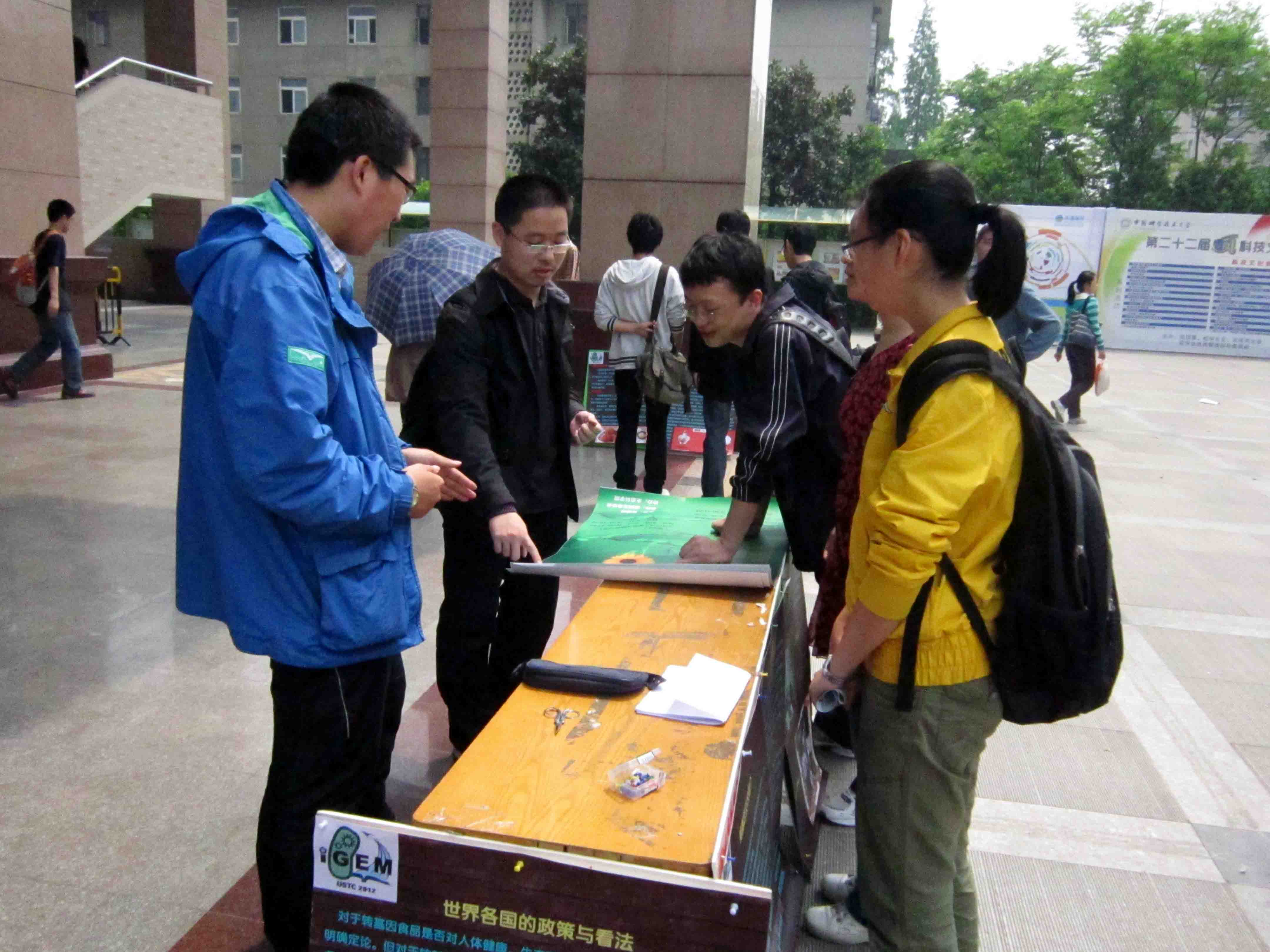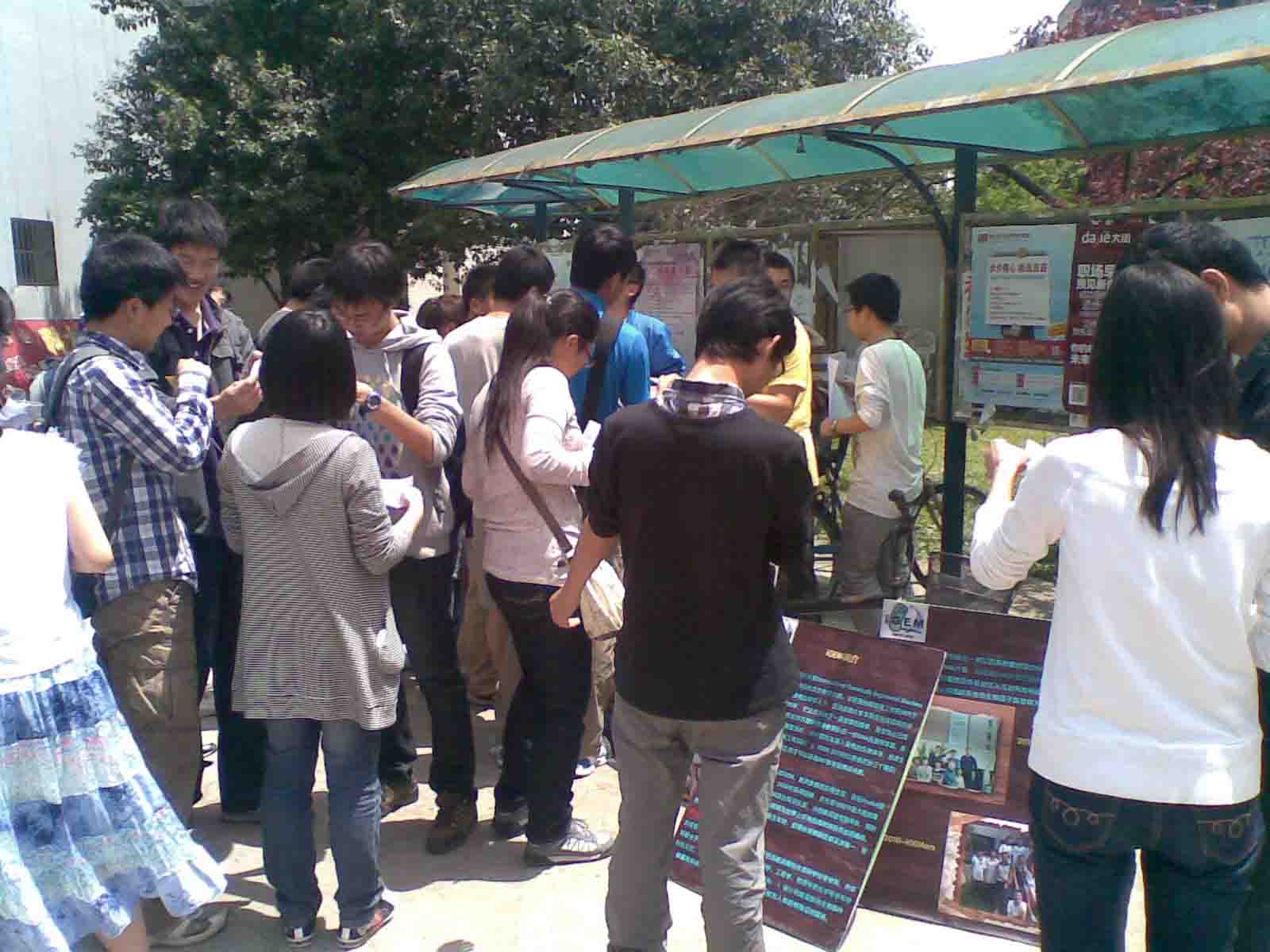Team:USTC-China/foodsafety
From 2012.igem.org
| Line 148: | Line 148: | ||
style="clear:both;width:360px;height:270px;"></a><br><small align="center">Students in the west campus participate in our quiz game actively! </small> | style="clear:both;width:360px;height:270px;"></a><br><small align="center">Students in the west campus participate in our quiz game actively! </small> | ||
</div> | </div> | ||
| - | <div class="imgholder1" align="center" | + | <div class="imgholder1" align="center" style="float:right;width:360px;height:auto;margin-bottom:34px;"> |
<a href="https://static.igem.org/mediawiki/2012/6/60/Foodsafety7.jpg"><img src="https://static.igem.org/mediawiki/2012/6/60/Foodsafety7.jpg" alt="project image" | <a href="https://static.igem.org/mediawiki/2012/6/60/Foodsafety7.jpg"><img src="https://static.igem.org/mediawiki/2012/6/60/Foodsafety7.jpg" alt="project image" | ||
style="clear:both;width:360px;height:270px;"></a><br><small align="center">Our team members are checking the answers. </small> | style="clear:both;width:360px;height:270px;"></a><br><small align="center">Our team members are checking the answers. </small> | ||
</div> | </div> | ||
| - | + | <br/> | |
<h3><a name="1.4">Conclusion</a></h3> | <h3><a name="1.4">Conclusion</a></h3> | ||
<p>By carrying out a series of activities, some of the students in our campus get a new understanding of transgenosis and synthetic biology. Instead of convincing people that "synthetic biology is good", what we have done helps people consider the pros and cons of ongoing advances in biotechnology. </p> | <p>By carrying out a series of activities, some of the students in our campus get a new understanding of transgenosis and synthetic biology. Instead of convincing people that "synthetic biology is good", what we have done helps people consider the pros and cons of ongoing advances in biotechnology. </p> | ||
| Line 189: | Line 189: | ||
</div> | </div> | ||
<p>Several questions were designed to evaluate students' confirmation extent towards GMF. After data processing we concluded as the diagram shows: nearly 50% students consider the GMF may have potential risks and choose to avoid buying GMF if told in advance; 32% students say that they pay no specific attention to GMF when choosing food; and 22% students hold the opinion that GMF contribute to the development of agriculture in China and its safety is ensured under the government regulation. </p> | <p>Several questions were designed to evaluate students' confirmation extent towards GMF. After data processing we concluded as the diagram shows: nearly 50% students consider the GMF may have potential risks and choose to avoid buying GMF if told in advance; 32% students say that they pay no specific attention to GMF when choosing food; and 22% students hold the opinion that GMF contribute to the development of agriculture in China and its safety is ensured under the government regulation. </p> | ||
| + | <br/> | ||
<p> | <p> | ||
<a href="https://static.igem.org/mediawiki/2012/1/1c/Survey_on_transgenic_products_and_their_information_transmission..pdf" target="blank"><img src="https://static.igem.org/mediawiki/2010/9/91/PKU_Adobe_Reader_Logo.jpg" width="20">Download PDF version of the Questionnaires.</a><br> | <a href="https://static.igem.org/mediawiki/2012/1/1c/Survey_on_transgenic_products_and_their_information_transmission..pdf" target="blank"><img src="https://static.igem.org/mediawiki/2010/9/91/PKU_Adobe_Reader_Logo.jpg" width="20">Download PDF version of the Questionnaires.</a><br> | ||
| - | |||
</p> | </p> | ||
Revision as of 08:31, 22 September 2012
FOOD SAFETY
GMF safety activity
During April 19th and 26th, we held an one-week activity concerned with genetic modofied food and synthetic biology in our campus.
With the genetic engineering technology developed, more and more countries begin to plant transgenic plants. These plants are not only used widely in industry, but also used as human food. Though there still remains an international hot discussion with the safety of transgenic food, transgenosis has played an important role in our daily life.In order to attract students's attention on genetic modified food(GMF) and spread knowledge related with transgenic and synthetic biology, members from 2012-USTC iGEM team carried out an activity called " Today, do you meet transgenosis?—Popularization of the knowledge about GMF safety."This activity has three sections, namely "Get to know the transgenosis","Movies about transgenosis" and the "transgenosis Quiz Game ".
Get to know the transgenosis
At April 19th, we showed our elaborate display boards on which wrote the description of transgenic technology, safety of transgenic food, markets of transgenic food and introduction of IGEM. Students attended were provided with detailed presentations by our team members at the activity location. After the activity,we kept these exhibition boards in our teaching buildings for several weeks in order to make more people get a deeper understanding of transgenic technology and synthetic biology.
Movies about transgenosis
At April 22th, we played movies talking about transgenic food in classroom 2210 east campus and classroom 3121 west campus each. The movies used a vivid way to tell people how transgenic technology influence our daily life.After the movie, we did a survey among the audiences and the survey showed most students's attitude towards GMF are quite negative, and they lacked the knowledge of the safety issues of GMF food.(get to know more about the survey)
Transgenosis Quiz Game
At April 26th, we held a quiz with awards in the students' center. Questions about the GMF and synthetic biology were asked, which were easy to answer as long as the participants had carefully read our boards. This activity won great concerns and many students took part in the answering actively. We awarded the participants with small gifts and our homemade models of DNA and virus.
Conclusion
By carrying out a series of activities, some of the students in our campus get a new understanding of transgenosis and synthetic biology. Instead of convincing people that "synthetic biology is good", what we have done helps people consider the pros and cons of ongoing advances in biotechnology.
Survey: Analyzation of the effectors on GMF purchasing
It is axiomatic that the GMF is around us. Although our country China has not produce genetically modified crops at large, we have imported lots of GMF from the United States of America (USA) and Argentina. Over a half of the oil in China is manufactured using genetically modified (GM) soya beans. Related closely to our daily life, however, GMF is being purchased with little recognition.
During our activity "Safety of genetically-modified food Learning", we conducted a survey concerned with the effectors that influence the GMF buying process in our campus. Generally, we have classified those aspects into four kinds: the price, the recognition extent, the learning access and the confirmation extent. Half of the questionnaires were dispersed to the participants of our activity and half of them were passed to students majoring in biology. Finally, we got one hundred and twelve questionnaires back. The results are as follows:
Price
Given the precondition that the price of GMF is cheaper than that of the traditional food, 73% of the students show their unwillingness to choose the GMF.
The recognition extent
The survey shows that 97% students have heard about the genetical modified food and more than 50% students claim that they know GMF well.
The learning access
Three effective access indicated in our survey are the TV, Internet and Book. Other alternative choices are the Magazine, Newspaper, Mobile, and communication with other people.
The confirmation extent
Several questions were designed to evaluate students' confirmation extent towards GMF. After data processing we concluded as the diagram shows: nearly 50% students consider the GMF may have potential risks and choose to avoid buying GMF if told in advance; 32% students say that they pay no specific attention to GMF when choosing food; and 22% students hold the opinion that GMF contribute to the development of agriculture in China and its safety is ensured under the government regulation.
![]() Download PDF version of the Questionnaires.
Download PDF version of the Questionnaires.
About the safety of genetically-modified food(GMF)
Unlike the conventional breeding technique which is widely accepted by the public, the safety of GMF is still on debate among people around the world. This may due to the fact that exogenous genes inserted into the organism come from a large range of creatures from the microorganism to techniqueanimals. It is difficult for scientists to specifically foresee the interaction between the exogenous genes and their new genetic background. Yet, theoretically the exogenous genes used in GMF are well studied in their functions, whose outcome is more easy to predict than the highly random process in Distant sexual hybridization. In this sense, the application of genetic modified technique should be safer.
Two safety factors should be considered when dealing with the GMF, namely, the food safety and the environment safety. GMF can directly affect human through raising the probability of food allergy or, indirectly transfer the exogenous genes and their mutation into the microorganism in the human body. As for the environment, "super weed" which has strong vitality may appear. The planting of GMO containing pest resistance gene could lead to a natural selection on pests, leading to a situation where no effective ways can be used to put out those evolved pests. Also, it is possible that the exogenous genes be transferred into other organism in nature. What's more, GMF can have a influence on biodiversity.
Internationally renowned authorities, including WHO and FAO, believe that the safety level of GM food is not inherently lower than conventional food. Moreover, there is no scientific or medical evidence to suggest that GM food is unsafe to humans at present. Despite its potential risks, GMF help relieve the world of poverty and hungry. By apply genetic modified engineering technology to agriculture, people gain much more and high quality food in a short period of time.
How the public get to know GMF?
The survey suggests that the students' attitudes towards GMF are quite negative. Our samples are believed to have already know GMF at some extent, which is also shown in the survey. Their attitudes may be guided by the mass media. For example, massive negative reports against GMF may cause some misunderstandings on them. Also, the confidence people have on the national certification system is weaken. Since some food safety problems occurred before, people may start doubt about the credibility of the safety certification system. The society lacks an authorized and impartial assessment system to guide the recognition towards GMF.
The rapid development of GMF indeed goes beyond the comprehension ability of the popular. In addition, various advertisements intensionally released may confuse the public. Meanwhile, people have different access to information. People's recognition extent and understanding to the new knowledge are different, so as their acuity for science. All this differences can lead to the different attitudes on GMF, which ends up in a heated debate.
Our suggestion
To get the public better understand GMF , the mass media should take their responsibility to introduce the relevant science knowledge to people. Some activities may be conducted to attract people's eyes on this issue. On the other hand, the government should enhance their surveillance and reestablish their credibility among the citizens.
 "
"












